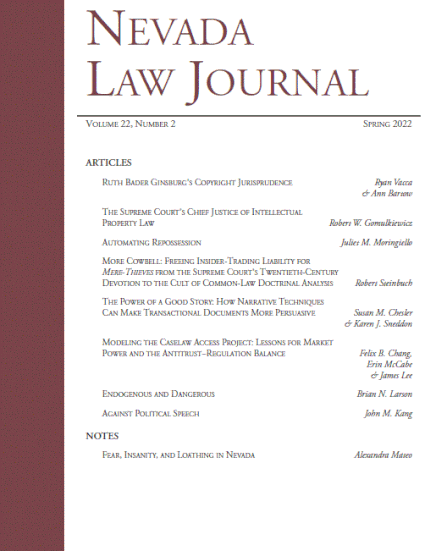
Article
Automating Repossession
Nevada Law Journal
(2022)
Abstract
Imagine if you bought a refrigerator from BestBuy on credit and BestBuy reserved the right to disable that refrigerator remotely if you failed to pay. This is not a future fantasy; subprime car lenders have been doing something similar for two decades. Many goods are connected to networks that allow the seller of the goods to retain some measure of control over them. These “smart goods” pose several challenges to the law, notably to the rules that govern creditors’ remedies when the owner of smart goods collateral defaults on the loan secured by such collateral. A creditor with a security interest in smart goods has the technological capacity to disable such goods remotely upon the borrower’s default.
Automating Repossession addresses a question that has no clear answer in commercial law – does a creditor have the right to remotely disable collateral upon its debtor’s default? As physical goods are increasingly connected to online networks in ways that allow their sellers to control their use, it is possible for secured lenders to deploy a remote and automated repossessor to disable tangible collateral in the event of a borrower’s default. Article 9 of the Uniform Commercial Code (UCC), which allows a secured creditor to repossess collateral upon its debtor’s default without resorting to the courts only if it can do so without a breach of the peace, does not address this practice. A handful of states have responded to the use of remote disablement by enacting amendments to their versions Article 9 of the UCC or their statutes aimed more specifically at consumer protection. In the vast majority of U.S. jurisdictions, the law is silent as to whether a remote disablement is equivalent to a self-help repossession and thus imposes no limitations on its use.
This paper recognizes that remote disablement should be a permissible creditor remedy in the UCC and proposes appropriate limitations on its use. To craft appropriate limitations, the article explores the history of the breach of the peace standard in repossessions involving physical contact. Rejecting that standard for automated repossessions, the article draws from contractual, legislative, and judicial sources to suggest limitations on remote disablement that address the unique harms caused by that remedy. Those sources include contracts governing remote disablement in the subprime automobile lending industry, the handful of existing laws governing the practice, and the restrictions on self-help remedies in the laws governing physical repossessions such as evictions, digital disablement of computer software, and remedies that cross the digital-physical divide in satellite financing. The article concludes by considering the interests that might be violated when a creditor crosses the digital-physical divide to remotely disable physical collateral and makes recommendations about how the UCC should address remote disablement as a creditor remedy.
Keywords
- Uniform Commercial Code,
- Secured Transactions,
- Smart Contracts,
- Smart Goods,
- Remedies,
- Repossession
Disciplines
Publication Date
Spring 2022
Citation Information
Juliet M Moringiello. "Automating Repossession" Nevada Law Journal Vol. 22 Iss. 2 (2022) p. 563 Available at: http://works.bepress.com/juliet_moringiello/62/
